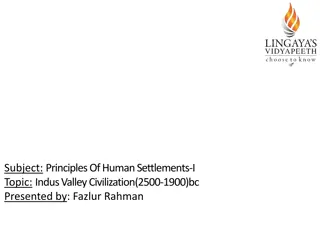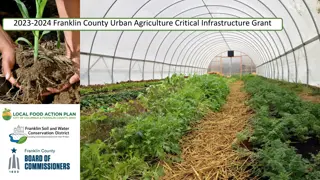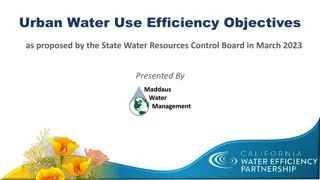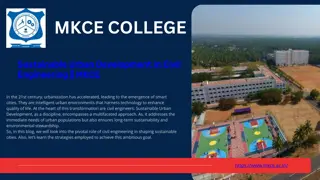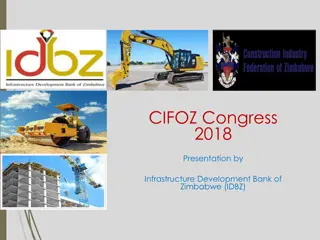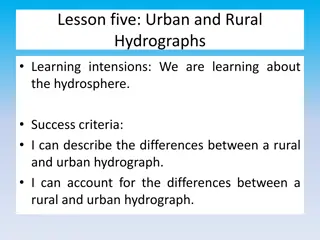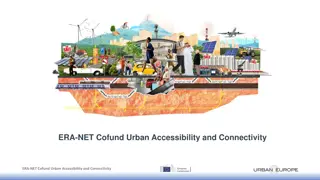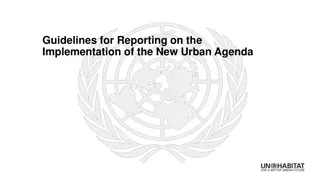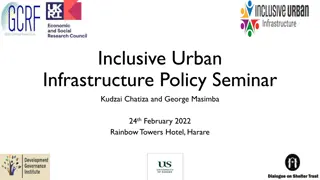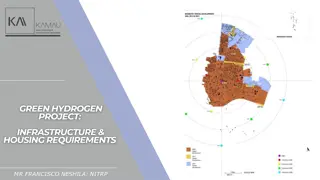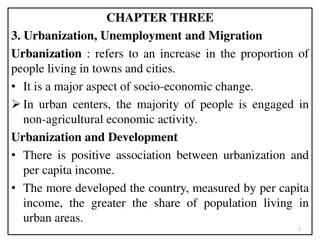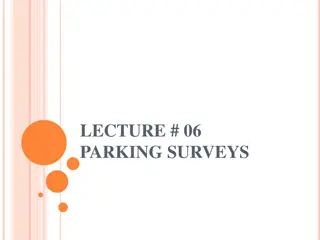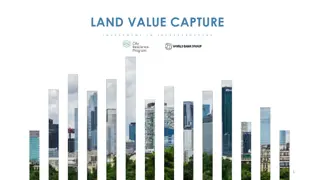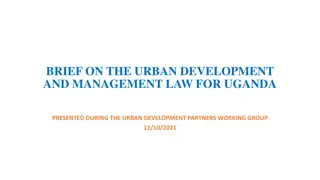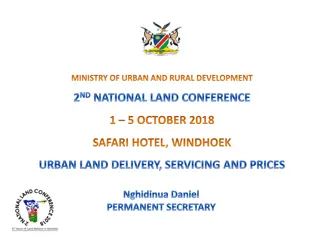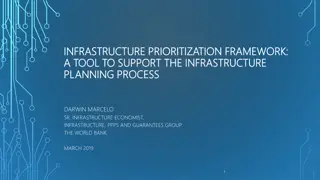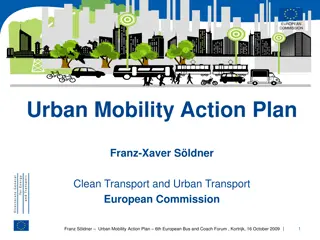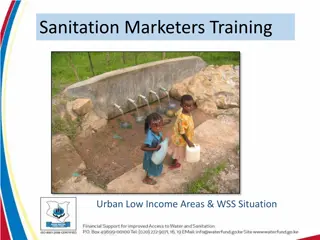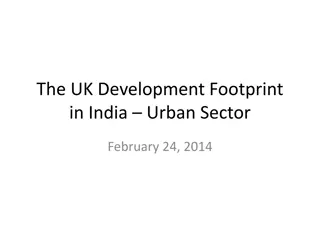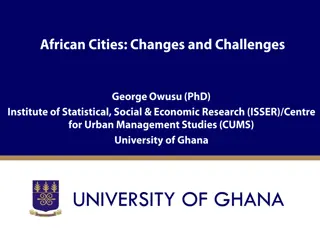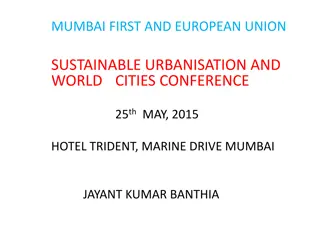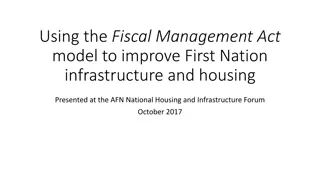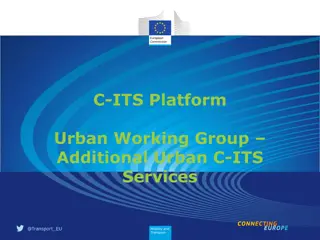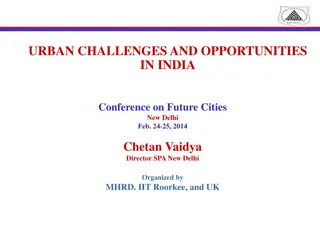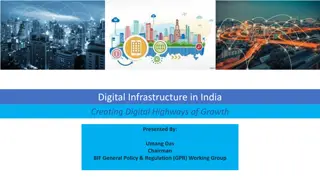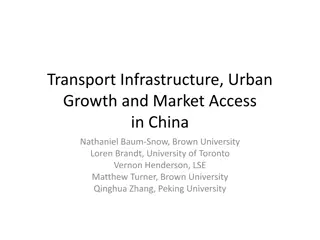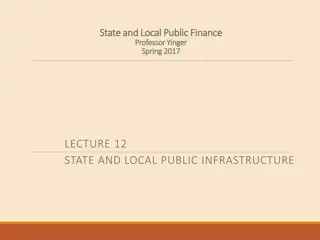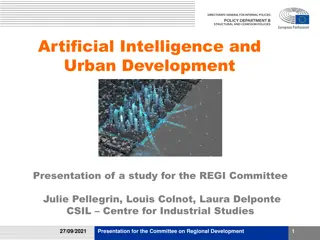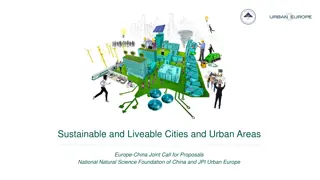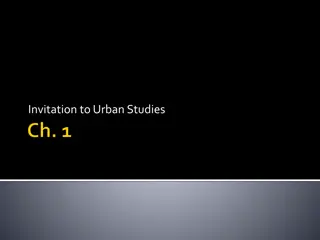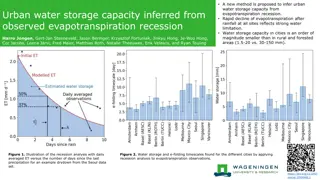Challenges and Progress in Chilean Infrastructure Development
The challenges of Public-Private Partnerships (PPPs) in Chile within the framework of best practices and international standards are discussed, highlighting the need for long-term infrastructure planning and enhanced governance. The 2017 OECD Infrastructure Governance Review identified deficiencies
4 views • 40 slides
Enhancing Urban Resilience in BRICS through Integrated Infrastructure and Sustainable Development
Dr. George Tsibani discusses the importance of water resilience, sustainable development goals, and the role of BRICS in fostering smart cities and rural-urban integration. The focus is on building resilience in urban water systems for economic growth and societal well-being. Solutions are proposed
1 views • 14 slides
Urban Development Models: Burgess and Hoyt
The Burgess concentric ring model and Hoyt sector model are key frameworks explaining urban social structures. Burgess's model illustrates urban land use in rings around the CBD, while Hoyt's model emphasizes outward growth along transportation arteries. Criticisms include applicability limitations
5 views • 13 slides
Dallas Comprehensive Urban Agriculture Plan Summary
Dallas's Comprehensive Urban Agriculture Plan focuses on promoting urban agriculture to ensure all communities have access to healthy, local food. The plan includes strategies to reduce regulatory barriers, support land access, provide education and resources, facilitate partnerships, and build mark
6 views • 7 slides
Franklin County Urban Agriculture Critical Infrastructure Grant 2023-2024
This grant initiative in Franklin County aims to strengthen the local food supply chain, support urban farms, and provide critical infrastructure funding to eligible organizations. With a focus on increasing food crop production and distribution while ensuring support for socially disadvantaged farm
0 views • 12 slides
State Water Resources Control Board's Urban Water Use Efficiency Objectives
The State Water Resources Control Board proposed Urban Water Use Efficiency Objectives in March 2023 to address the challenges of a hotter, drier future. The objectives include creating storage space for up to 4 million acre-feet of water, recycling and reusing at least 800,000 acre-feet of water pe
0 views • 32 slides
Sustainable Urban Development in Civil Engineering MKCE
In the 21st century, urbanization has accelerated, leading to the emergence of smart cities. They are intelligent urban environments that harness technology to enhance quality of life. At the heart of this transformation are civil engineers. Sustainable Urban Development, as a discipline, encompasse
0 views • 2 slides
Infrastructure Development Bank of Zimbabwe (IDBZ) - Financing Zimbabwe's Infrastructure Needs
The presentation by the Infrastructure Development Bank of Zimbabwe (IDBZ) at the CIFOZ Congress 2018 outlines the critical infrastructure sectors, funding requirements, and the funding gap faced by Zimbabwe. IDBZ is mandated to facilitate infrastructure development in key sectors like ICT, housing,
4 views • 20 slides
Contrasting Urban and Rural Hydrographs
Hydrographs in urban and rural areas exhibit distinct characteristics due to differences in land use and infrastructure. Urban hydrographs typically display steeper rising and falling limbs, shorter lag times, and higher peak discharge rates compared to rural hydrographs, which have gentler slopes a
0 views • 14 slides
ERA-NET Cofund Urban Accessibility and Connectivity
ERA-NET Cofund Urban Accessibility and Connectivity focuses on enhancing urban accessibility and connectivity through collaboration among national funding agencies. The initiative aims to improve urban infrastructure and transportation systems to create more accessible and connected cities. Contact
0 views • 4 slides
Evaluation of Malawi's COVID-19 Urban Cash Intervention: Unintended Consequences
Malawi implemented the COVID-19 Urban Cash Intervention (CUCI) to assist urban poor populations during the pandemic. Evaluations focused on efficiency, impact on food security, and unintended consequences. The CUCI targeted 35% of the urban population, providing financial assistance for three months
0 views • 18 slides
Guidelines for Reporting on the Implementation of the New Urban Agenda
The guidelines emphasize the importance of periodic follow-up and review of the New Urban Agenda by Member States to ensure effective implementation. They stress inclusivity, transparency, and voluntary participation in tracking progress towards sustainable urban development goals. The document outl
2 views • 11 slides
Inclusive Urban Infrastructure Policy Seminar Overview 24th February 2022
This seminar discusses urban infrastructure challenges in the context of rapid global South urbanization, focusing on differential service access patterns, trajectories of inclusion, and interventions to address inequality. Research objectives include understanding infrastructure access in off-grid
0 views • 11 slides
Urban Land Management and Infrastructure Delivery: Challenges and Solutions
The analysis delves into various aspects of urban land management, including growth analysis, property market overviews, economic statistics, and infrastructure requirements for green hydrogen in Lüderitz. It highlights the need for a national urban land framework to ensure secured, equitable, affo
1 views • 9 slides
Urbanization, Unemployment, and Migration: Impact on Socio-Economic Development
Urbanization, a key factor in socio-economic change, is linked to per capita income growth. The association between urbanization and development is evident worldwide, with rapid urban growth in developing countries. In Africa, high rural-urban migration and urban fertility rates drive urbanization.
3 views • 31 slides
Understanding Parking Surveys for Urban Planning
Parking surveys play a crucial role in urban planning and traffic management by providing data on parking space availability, usage, and demand. These surveys help in determining effective parking policies, such as pricing strategies and duration limits. Different types of surveys, including parking
0 views • 15 slides
Enhancing Infrastructure Investment Through Land Value Capture Mechanisms
Explore the role of Land Value Capture (LVC) in financing urban infrastructure projects, enabling governments to secure upfront funding by capturing real estate value gains. LVC promotes cost-sharing, incentivizes policy measures, and unlocks additional financing in the face of limited traditional s
1 views • 46 slides
Overview of Uganda's Urban Development and Management Law
Vision 2040 and National Development Plan emphasize the pivotal role of cities in Uganda's development. The absence of a legal framework for urban development led to fragmented mandates across ministries. Efforts are underway to establish a comprehensive legal framework for sustainable urban develop
0 views • 5 slides
Challenges and Solutions in Urban Land Delivery and Pricing in Namibia
The Urban Land and Housing Sector in Namibia faces significant challenges such as a backlog in land delivery, high input costs, weak urban planning, and limited institutional capacity. These issues lead to slow supply rates and affordability problems for end users. Addressing these challenges requir
0 views • 20 slides
Overview of SULM Bihar State Urban Livelihood Mission
The SULM Bihar State Urban Livelihood Mission, an initiative under the National Urban Livelihoods Mission (NULM), aims to empower urban poor households through self-employment and skilled wage opportunities. The mission focuses on poverty reduction and enhancing livelihoods sustainably by establishi
0 views • 13 slides
Infrastructure Prioritization Framework and Challenges
The Infrastructure Prioritization Framework (IPF) is a tool designed to support the infrastructure planning process, aiming to address challenges such as infrastructure gaps, limited resources, and technical capacity constraints. The tool integrates social, environmental, and financial criteria to h
1 views • 25 slides
Roundtable on Urban Regeneration: Social Value Creation with Diverse Speakers
The Roundtable on Urban Regeneration focuses on challenges posed by Covid-19, Climate, and Conflicts on inequalities. It explores how urban regeneration can address these challenges and create social value while reducing poverty and inequality. The event also delves into the role of the private sect
0 views • 15 slides
European Commission Urban Mobility Action Plan Overview
The European Commission's Urban Mobility Action Plan focuses on promoting sustainable urban transport to address the challenges faced by urban areas in Europe. The plan emphasizes the importance of efficient transport for economic growth, citizen concerns related to urban mobility, and the role of t
0 views • 12 slides
Introduction to Terraform for Infrastructure Automation
Terraform is a powerful tool used for building, changing, and versioning infrastructure efficiently and safely. It operates based on Infrastructure as Code principles, allowing for versioning of infrastructure configurations like any other code. With features like Execution Plans, Resource Graph, an
0 views • 27 slides
Impacts of Marketisation on Home Care for Older People in Urban China
This study by Wenjing Zhang from the University of Bristol delves into the effects of the marketisation process on home care for the elderly in urban China. It explores the rationale behind the marketisation of care, the trends in home care marketisation, and the processes involved. The background s
0 views • 19 slides
Target Areas for Sanitation Marketers Training in Urban Low-Income Areas
Target areas for sanitation marketers training in urban low-income areas include informal settlements, planned urban areas with low-income housing, informal housing in planned residential areas, urban IDP settlements, and urban sub-centers. These areas present challenges with water supply and sanita
0 views • 18 slides
UK Development Footprint in India Urban Sector - Towards Smart Urbanisation
The UK has been engaged in the urban sector in India for over 30 years, focusing on slum infrastructure development initially and transitioning towards sustainable development and smart urban growth. The emerging priority is smart urbanisation, aiming to build inclusive and climate-resilient cities
0 views • 10 slides
Understanding African Urbanization: Challenges and Trends
Unpacking the narratives of African urbanization and cities, this collection explores Africa's unique urban revolution, urban challenges, and the prevalence of informality in its cities. Data and projections highlight the evolving urban landscape across different regions in Africa, emphasizing the s
0 views • 14 slides
Urbanization in India: Trends and Challenges
The urban population in India has seen significant growth over the years, reaching 31.30% in 2011. However, urbanization in India faces challenges such as lopsided growth, lack of industrialization, and issues with rural-urban migration. Despite this, India has a dispersed urban population, with var
0 views • 21 slides
Improving First Nation Infrastructure and Housing through Fiscal Management Act Model
The presentation at the AFN National Housing and Infrastructure Forum in October 2017 highlighted the challenges faced by First Nation communities in developing sustainable infrastructure. The current system is inefficient, prompting the exploration of alternatives like the First Nations Fiscal Mana
1 views • 9 slides
Urban C-ITS Services for Enhanced Mobility and Transport Management
Urban C-ITS (Cooperative Intelligent Transport Systems) Working Group discusses additional services for improving mobility and transport in urban areas. Outcomes of meeting 1 include various C-ITS services like traffic signal priority, green light optimization, traffic information, and more. The cat
0 views • 24 slides
Urban Challenges and Opportunities in India: Strategies for Future Cities
This content discusses the urban challenges and opportunities in India, focusing on population trends, urban initiatives, and the Jawaharlal Nehru National Urban Renewal Mission (JNNURM). It emphasizes the need for sustainable, inclusive, and smart cities with strategies such as improving urban gove
0 views • 8 slides
Digital Infrastructure in India: Creating Pathways for Economic Growth
Digital infrastructure in India plays a crucial role in driving economic growth and development. The focus on creating a national digital grid and catalyzing investments in digital infrastructure is essential for the country's digital transformation. Improving digital infrastructure can unlock signi
12 views • 10 slides
Impact of Transport Infrastructure on Urban Growth and Market Access in China
Examining the effects of new highways and railroads on urban growth in Chinese prefectures and cities, this study investigates mechanisms internal to cities, such as improved market access. It delves into the influences on growth versus redistribution and highlights the motivations behind massive in
0 views • 34 slides
Understanding State and Local Public Infrastructure Finance
Exploring the significance of state and local public infrastructure finance, this lecture discusses the need for investment in long-lived public assets like roads, bridges, water systems, and energy production. It highlights the urgency to address the deteriorating infrastructure in the US and the i
0 views • 33 slides
Understanding Urban Sociology: A Comprehensive Overview
Urban sociology explores the dynamics of city life, urbanization, and urban communities. It delves into the origin and development of cities, social structures, family dynamics, class struggles, urban issues, and more. Key elements include population density, family structures, occupations, social h
0 views • 6 slides
Role of Artificial Intelligence in Urban Development: Study Presentation for the REGI Committee
Explore the implications of AI in urban development, addressing key definitions, expected benefits, potential risks, enabling conditions, and EU policy. Emphasize the importance of governance in implementing AI in urban contexts, highlighting benefits like improved urban management, economic opportu
0 views • 14 slides
Europe-China Joint Call for Sustainable Urban Development
This joint initiative between JPI Urban Europe and NSFC aims to promote research projects focusing on sustainable and liveable cities in both Europe and China. With a budget of 9.35 million euros on the European side, the call seeks to address key urban challenges such as economic transformation and
0 views • 21 slides
Insights into Urban Studies: Sociological Variables and Cultural Influences
Delve into the world of urban studies, exploring how urban sociology investigates systematic causes and effects on people in urban environments. Discover the challenges of defining 'urban,' understanding informal city structures, and navigating public spaces. Uncover the cultural influences of citie
0 views • 12 slides
Inference of Urban Water Storage Capacity from Evapotranspiration Recession Analysis
A new method is proposed to estimate urban water storage capacity based on evapotranspiration recession analysis, showcasing the significant differences between urban and rural/forested areas. The study highlights the strong water limitations in cities, leading to smaller water storage capacities. F
0 views • 4 slides


